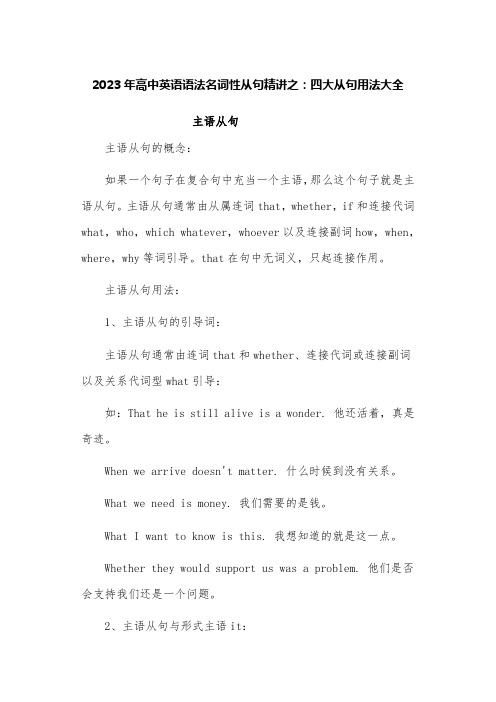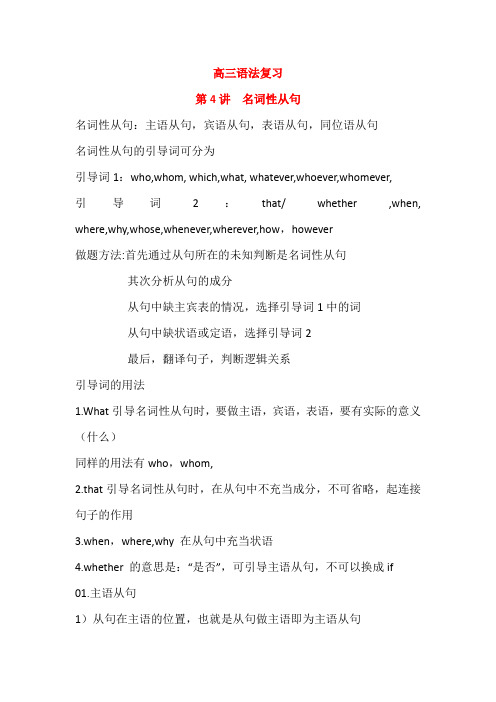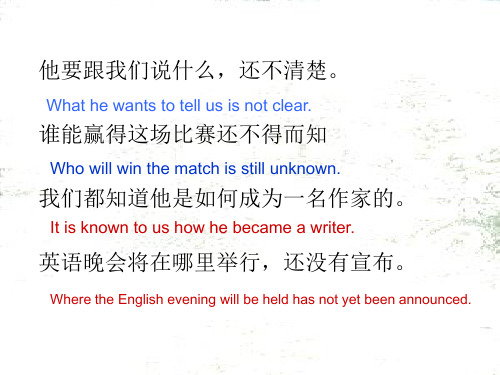4 名词性从句
名词性从句之从属连词课件_4

考点5 连词that的省略
知识回顾: 1. that引导的主、表、同位从句不省; 2.而that引导的宾从可以省。但当动词后带有多个that引导的 宾语从句时,第一个宾语从句可省,其后的宾从不能省。 3. 在that引导的宾语从句中,从句中又包含从句时不能省。
下列句中的that哪些是可以省略的?
( ) 2). I wondered _w__h_y_ you were so angry.
别忘了:缺状语 考虑连接副词
总之:分析从句的句子成分,缺什么,补什么;
不缺句子成分,不缺意思,就选__t_h_a_t__。不
缺句子成分,只缺“是否”, 就选
__w__h_e_t_h_e_r_或 if。缺主语/宾语/表语,就选连 接___代___词,如what, who, whom, which等; 缺状语,就选连接_____副____词,如when,
连词
if / whether
/ 是否
what (ever) (无论)什么
which (ever) (无论)哪个
连接 代词
连接 副词
who (ever) (无论)谁
whom (ever) whose when where why how
(无论)谁 谁的
什么时候 在哪里 为什么 怎样
在词中所充当的成分 / /
考点3 which\what的选用
知识回顾: what 表示泛指的事物,常译为"什么"或"所……的事物"; which表示某个范围内的“哪一个(些)”。
考点3 which\what的选用
• I want to buy something for my mother, but I don’t know __w_h_a_t____ to buy.
2023届高考英语语法名词性从句精讲之四大从句用法大全讲义

2023年高中英语语法名词性从句精讲之:四大从句用法大全主语从句主语从句的概念:如果一个句子在复合句中充当一个主语,那么这个句子就是主语从句。
主语从句通常由从属连词that,whether,if和连接代词what,who,which whatever,whoever以及连接副词how,when,where,why等词引导。
that在句中无词义,只起连接作用。
主语从句用法:1、主语从句的引导词:主语从句通常由连词that和whether、连接代词或连接副词以及关系代词型what引导:如:That he is still alive is a wonder. 他还活着,真是奇迹。
When we arrive doesn't matter. 什么时候到没有关系。
What we need is money. 我们需要的是钱。
What I want to know is this. 我想知道的就是这一点。
Whether they would support us was a problem. 他们是否会支持我们还是一个问题。
2、主语从句与形式主语it:有时为了考虑句子平衡,通常在主语从句处使用形式主语it,而将真正的主语从句移至句末。
这分三种情况:(1)对于以连词that引导的主语从句,通常用形式主语代主语从句:如:It's a pity that he didn't come. 很遗憾他没来。
(2)对于以连接代词(副词)引导的主语从句,可以使用形式主语代主语从句,也可直接在句首使用主语从句:如:Whether they would support us was a problem. 他们是否会支持我们还是一个问题。
It was a problem whether they would support us. 他们是否会支持我们还是一个问题。
(3)对关系代词型what引导的主语从句,通常不用形式主语,总是主语从句放在句首:如:What we need is money. 我们需要的是钱。
高三语法复习名词性从句(教师版)

高三语法复习第4讲名词性从句名词性从句:主语从句,宾语从句,表语从句,同位语从句名词性从句的引导词可分为引导词1:who,whom, which,what, whatever,whoever,whomever,引导词2:that/ whether ,when, where,why,whose,whenever,wherever,how,however做题方法:首先通过从句所在的未知判断是名词性从句其次分析从句的成分从句中缺主宾表的情况,选择引导词1中的词从句中缺状语或定语,选择引导词2最后,翻译句子,判断逻辑关系引导词的用法1.What引导名词性从句时,要做主语,宾语,表语,要有实际的意义(什么)同样的用法有who,whom,2.that引导名词性从句时,在从句中不充当成分,不可省略,起连接句子的作用3.when,where,why 在从句中充当状语4.whether 的意思是:“是否”,可引导主语从句,不可以换成if 01.主语从句1)从句在主语的位置,也就是从句做主语即为主语从句Eg1. what made me so happy is the good news I received about herEg2.That he wins the first prize in the competition mad me so delighted . Eg3.where I will go hasn’t been decided .Eg4.whether I accept your invitation is up to you.It 做形式主语,真正的主语是从句,常见的句型有It is+ adj(necessary ,important,essential,natural,strange ) that...It is +n(a pity, shame, no wonder) that......It is said /reported/ believed......It seems /appears/matters that.......02宾语从句(在谓语动词后/介词后,一个句子作宾语)Eg1.I didn’t know what he was talking about .Eg2.I always wonder how close the relationship between them.Eg3.I am glad to know that he came back safe and sound .It 做形式宾语主语+ find、make,feel,consider,see to,depend onEg I find it important that we should respect the old people.03表语从句(be动词和系动词之后用句子做表语)Eg1. That is what I want to tell you .Eg2.what confused me is that he should break up with herEg3.By boat is the only way to get here, which is how we arrived.常见的表语从句句型(1)It seems/appears that...(2)This/That is because/why/where/when/how...(3)The question/problem is whether/when/where/how...(4)The suggestion/advice/purpose/aim/goal/dream is that...(5)What从句+be+ that从句例如:What annoyed me most was that he came late again.04同位语从句1)同位语从句的结构:表示内容的先行词+引导词+从句2)同位语从句是对先行词的解释说明3)同位语从句的先行词一般是包含一定内容的抽象名词,如;suggestion、advice、proposal、thought、doubt、belief、news、promise、word、notice、request、requirement,problemEg1. He made a promise to me that he won’t be late for the class once again.4)同位语从句和定语从句的区别定语从句对先行词是起修饰作用,做出限定同位语从句对先行词是解释说明that的用法不同,在定语从句中that是关系代词在从句中做主语宾语表语在同位语从句中,that在从句中不做任何成分Here comes the news that he is admitted to the university.(同位语从句) Here comes the news that I am looking forward to .(定语从句)05wh-ever引导的名词性从句(无论....)1)引导词1:whatever/ whoever/ whomever/whichever(无论哪一个)在从句中做主宾表成分引导词2:whenever/ wherever/however在从句中做状语I can do whatever I want to doWhoever comes to English class late will sing a song for other students2)Wh-ever =no matter wh-Wh-ever 结构可以引导状语从句和名词性从句No matter wh-只能引导状语从句3)wh-和wh-ever 的区别wh-ever 译为无论.....,没有范围和条件wh-指特定的人,事情,地点等Eg1. Who is the next one to answer the question?Whoever answers the question can get a candy .Exercise 11.(2024·天津河西区模拟)_______ I’m concerned about most is_______we can collect a huge amount of money in such a short time. A.That; how B.What; if C.What; how D.As; whether【解析】选C。
名词性从句4类型基础翻译题

• 我们赢得这场比赛的消息令人激动。
The news that we won the game is exciting.
• 我不知道他什么时候回来。
I have no idea when he will come back home.
• 事实是我们已经输了这场比赛。
The fact is that we have lost the game.
• 这正是我想要的。
That’sห้องสมุดไป่ตู้just what I want.
• 那就是他为什么不到会的原因。
That is why he didn’t come to the meeting.
• 看上去天要下雨了。
• 我坚持要她自己工作。
I insist that she (should) do her work alone.
• 凡需要帮助的人,她都会给予热情的支持。
She will give whoever needs help a warm support.
• 月球上有没有生命是个有趣的问题。
Whether there is life on the moon is an interesting question.
• 他想到可能玛丽生病了。
The thought came to him that Mary had probably fallen ill.
英语晚会将在哪里举行,还没有宣布。
Where the English evening will be held has not yet been announced.
• 他已经告诉我他明天要去上海。
名词性从句连接词,及四种从句 全面

一、引导名词性从句的连接词引导名词性从句的连接词可分为三类:连接词:that,whether,if 不充当从句的任何成分)连接代词:what, whatever, who, whoever, whom,whose, which.连接副词:when, where, how, why不可省略的连词:1. 介词后的连词2. 引导主语从句和同位语从句的连词不可省略。
That she was chosen made us very happy.We heard the news that our team had won.比较:whether与if 均为"是否"的意思。
但在下列情况下,whether 不能被if 取代:1. whether引导主语从句并在句首2. 引导表语从句3. whether从句作介词宾语4. 从句后有"or not"Whether he will come is not clear.大部分连接词引导的主语从句都可以置于句末,用it充当形式主语。
It is not important who will go.It is still unknown which team will win the match.二. 主语从句作句子主语的从句叫主语从句。
主语从句通常由从属连词that,whether,if和连接代词what,who,which,whatever,whoever以及连接副词how,when,where,why等词引导。
that 在句中无词义,只起连接作用;连接代词和连接副词在句中既保留自己的疑问含义、又起连接作用,在从句中充当从句的成分。
例如:What he wants to tell us is not clear. 他要跟我们说什么,还不清楚。
Who will win the match is still unknown. 谁能赢得这场比赛还不得而知。
必修一和必修三四大名词性从句

名词性从句一、基本概念:由连接词引导,在复合句中起名词作用的从句叫名词性从句。
它在复合句中能担任主语、宾语、表语、同位语、介词宾语等,因此根据它在句中不同的语法功能,名词从句又可分别称为主语从句、宾语从句、表语从句和同位语从句。
二、名词性从句连词选择总原则:看从句中缺少什么成分,根据意思选择适当连接词语;如不缺成分且句意完整,则选用that。
:一找:从句;二查:缺什么成分;三选:合适的连接词1 主语从句一、定义:主语从句是在复合句中充当主语的从句,通常放在主句谓语动词之前或由形式主语it代替,而本身放在句子末尾。
二、引导主语从句的连接词主要有三类:连接词that,whether;连接代词what,who,whose,whatever,whichever,whoever等;连接副词when,where,why,how等。
三、连接词that,whether引导:(1)that:在从句中不作任何成分,也没有词汇意义,一般不可省略。
That the college will take in more new students this year is true.(2)whether:引导主语从句常放于句首,有时也用it作形式主语替代。
Whether he can finish his task on time is of great importance.【特别注意】(1)if不能引导主语从句。
(2)形式主语it替代主语从句。
常见的it替代主语从句的句式主要有以下几种:A.It+系动词+形容词(obvious/true/natural/surprising/good/wonderful/funny/possible/likely/certain/probable 等)+that从句:It is quite clear that the whole project is doomed to failure.B.It+系动词+名词词组(no wonder/an honor/a good thing/a pity/no surprise等)+that从句:It is our hope that the two sides will work towards peace.C.It+be+v.ed形式(said/reported/thought/expected/decided/announced/arranged)+that从句It is announced that the plan has been successfully carried out.D.It+动词短语/动词(occur to/appear/seen/matter/turn out/make no difference)+that三、连接代词引导:①What we can’t get seems better than what we already have.②Who the letter was from is still unknown.③Whichever of you gets here first will get the prize.四、连接副词引导:①How acupuncture reduces and relieves pain is unclear.针灸是如何减轻和解除疼痛的还不清楚。
名词性从句(4)
名词性从句名词性从句包括主语从句、宾语从句、表语从句和同位语从句。
主语从句:主语从句在复合句中作主语,能够放在主句谓语动词之前,也能够由it作形式主语,而将主语从句放在主句之后。
如:Why he left wasn’t important.It was uncertain whether he would come or not.宾语从句:宾语从句在句中作及物动词或介词的宾语。
如:I felt that he had a strong will.He will talk to us about what he saw in the school.表语从句:表语从句在句中作表语,位于主句中系动词之后。
如:The question is who is responsible for what has happened.He looked as if he was going to cry.同位语从句:同位语从句一般跟在某些表示抽象意义的名词后面,用来说明名词所表示的具体内容。
如:I had the impression that he chose his words with care.I have no idea when he will be back.关于名词性从句我们应该掌握以下几点:一、掌握引导名词性从句各类连接词的用法。
高考试题在考查名词性从句时,常考查引导名词性从句的连接词。
引导名词性从句的连接词有三大类:1. 单纯连接词:that,whether,if。
它们只起引导从句的作用,并不在从句中充当任何成分。
that在句中没有一定的含义。
whether和if有含义,表示“是否”之意。
注意,if只能用来引导宾语从句,不可引导主语从句、表语从句和同位语从句。
如:He told me that he would leave office soon.She asked me whether (if) I could lend her my dictionary.2. 连接代词what, who, which, whose, whom。
英语语法:四组名词性从句引导词用法区别
【导语】欢迎阅读为⼤家精⼼整理的英语语法:四组名词性从句引导词⽤法区别!欢迎阅读学习!更多相关讯息请关注! 四组名词性从句引导词⽤法区别 1. what 与that的⽤法区别 两者均可引导主语、表语、宾语从句,区别是what可在从句中⽤作主语、宾语或表语,意为“什么”或“所…的”,⽽that仅起连接作⽤,本⾝没有实际意义,在从句中也不充当任何句⼦成分(引导宾语从句时通常可以省略): He doesn’t know what she likes. 他不知道她喜欢什么。
What you say is quite right. 你所说的相当正确。
I believe (that) he will come to see us. 我相信他会来看我们的。
It’s a pity (that) he didn’t finish college. 真遗憾他⼤学没毕业。
另外,that 可引导同位语从句,但 what 通常不⽤于引导同位语从句: I had no idea that you were here. 我不知道你在这⼉。
2. whether与 if的⽤法区别 两者的⽤法异同注意以下⼏点: (1) 两者均可引导宾语从句,表⽰“是否”,常可互换: He asked if [whether] we wanted a drink. 他问我们是否想喝⼀杯。
He didn’t tell me if [whether] he would come. 他没有告诉我他是否会来。
【注】若是引导条件状语从句,则只能⽤ if(意为“如果”)。
(2) 当引导⼀个否定的宾语从句时,通常⽤ if ⽽不⽤ whether: I don’t care if it doesn’t rain. 我不在乎天是否下⾬。
【注】在个别词语(如 wonder, not sure 等)后的从句否定式有时也可⽤ whether 引导: I wonder if [whether] he isn’t mistaken. 我想知道他是否错了。
识别四类名词性从句的方法
从句在复合句中作主语时被称为主语从句;作宾语时被称为宾语从句;作表语时被称为表语从句;作同位语时被称为同位语从句。
如何识别这四类名词性从句呢?一、如何识别主语从句利用基本概念进行辨别:主语从句就是在复合句中作主语的从句。
识别要领:主语从句一般位于谓语动词的前面,但是应注意倒装时候的用法。
备注:为了避免主语从句放于句首造成头重脚轻的现象,常会使用it 作形式主语放于句首,而把主语从句放于句尾。
常见的主要有以下5种结构:1.It+be+adj.(obvious/nature/clear/true/good/surpris⁃ing/probable/wonderful/fortunate 等)+that+主语从句。
2.It +be +过去分词(reported/said/thought/an⁃nounced/believed/expected/confirmed 等)+that +主语从句。
3.It+be+名词(a pity/an honor/good news/no wonder/a fact 等)+that+主语从句。
4.It+不及物动词(词组)(happen/look/seem/appear/turn out 等)+that+主语从句。
5.It+及物动词(shock/worry 等)+that+主语从句。
引导词:连词有whether,that,if ;连接代词有who,what,which,whatever,whoever,whom,whose ;连接副词有where,when,why,how 等。
考例1:Exactly when Jenny will go to college is stillunclear,but I know she ’s preparing things for college now.(画线部分为主语从句)简析:画线部分在系动词is 之前,故可判断画线部分是主语从句。
名词性从句
名词性从句一.概念名词性从句共有四种:1.主语从句2.表语从句3.宾语从句4.同位语从句二.知识点1.主语从句:主语从句在整个句子中作主语。
(1)主语从句中的that不充当句子的成分,只是单纯的连接词,通常不省略。
分句置于句首时,that绝对不可以省略。
That the driver could not control his war was obvious.It was obvious that the driver could not control his car.2.表语从句:表语从句出现在系动词后,充当表语。
The trouble is that we are short of money.Go and get your coat. It’s where you left it.引导表语从句除了that, what, who, when, where, which, why, whether,how 外还有because, as if/ as though等等The reason (why/for which…..) is that ……It/This/That is because……连系动词“appear, look, seem”的两个常用句型It seems/appears that….It looks/seems as if/as though……(与事实相符用陈述语气,与事实相反用虚拟语气)It appears/appears that the two leaders are holding secret talks.It seems as if our team is going to win.(与事实相符)It looks as if she were ten years younger. (与事实相反)3. 宾语从句:(that可以省略)及物动词,形容词和介词后加宾语从句作其宾语。
- 1、下载文档前请自行甄别文档内容的完整性,平台不提供额外的编辑、内容补充、找答案等附加服务。
- 2、"仅部分预览"的文档,不可在线预览部分如存在完整性等问题,可反馈申请退款(可完整预览的文档不适用该条件!)。
- 3、如文档侵犯您的权益,请联系客服反馈,我们会尽快为您处理(人工客服工作时间:9:00-18:30)。
• That this has not happened may be the fault of the university • It may be the fault of the university that this has not happened. • • It is obvious that he will be late. •
举例3:
• My idea is that people will live on the moon someday. • My question is whether people will live on the moon someday. • My question is when people will live on the moon someday.
• 研究表明满意的工作对男人是有好处 的. • in the best interest of
• 我认为来自富国的帮助能帮助穷国降低贫 困。 •
• 该饼状图表明温室气体的增加促进了温室 效应 •
举例2:
• That the sea is blue has been known for years. • It has been known for years. • whether the sea is blue has been known for years. • why the sea is blue has been known for years.
铺垫2:连词
• 汉语
• 我不知道她会哭 • 我不知道是否她会哭 • 我不知道为什么他会哭。
连词
名词性从句的本质
主语 宾语 同位语 表语
本质:三种句子充当四种成分。 陈述句,一般疑问句, 特殊疑问句
举例1:
• I don't know that he will cry. • I don't know whether he will cry. • I don't know why he will cry.
• It is no doubt that “crimes against the person” rise in the summer, when the weather is hotter and fall in the winter, when the weather is colder.
• 主语从句特点:
• Researchers evaluated how serious this problem is and hoped to find ways to eliminate or sharply reduce this problem. • He wanted to see whether the sun alone controlled the birds' ability to navigate toward the box with food. • We will understand how a rocket operates by a simple analogy.
• 同位语句从句特点:
• 1. 延展性的名词 • 2. 从句紧紧地放于延展性词之后
• The fact that nations can even be at war against each other but, at the same time, have their young people compete peacefully in the sports arena says something quite wonderful about the human spirit's longing for peace and goodwill.
• That is the man who gave us a report yesterday.
• The biggest change in education in China is that it has become more available to more people.
• The view that language extinction will give rise to cultural disaster is an exaggeration. • If you make up your mind, you'll get the chance.
• 表从特点:be 动词+ 连词
• 最直接的原因是孩子太小以至于无法分清楚好和 坏。
•
• 作为唯一的一个孩子的好处是家里会有更少的争 吵。
•
• 作为交通阻塞的最主要的问题是它会耗费 油料。
举例4:
• The fact that he succeeded in the experiment pleased everybody. • Scientists have argued over the question whether there is life on other planets. • The assumption that robots will make humans redundant and replaceable is groundless.
• 参见: • 三种从句练习
回顾总结
• 本质:三种句子充当四种成分。 • 核心:连词
梁康老师: /u/2851356854 贵学教育新浪微博: /guixueedu 贵学教育官方网站:
• 宾从特点: 动+连
• Many believe that the story first began in America in 1872, when two friends argued over whether a horse ever had all four feet off the ground when it galloped.
• 有可能孩子会模仿电视中的暴力
• 女孩们喜欢嫁给有责任感的男孩这一事实 是夸张的。 •
• 语言的消失会引起文化灾难这一观点是危 言耸听。
•
• 关键的原因基于这个事实:广告起到了重 要的作用在宣传产品和扩大知名度方面。
鉴ห้องสมุดไป่ตู้练习
• How long the course takes is up to you. • He knows where he lives.
1, 连词位于句首 2, 主句的谓语动词3单 (一般现在时 ) 3, that 引导时常常替换it形式主语
• 在富国的帮助下有可能穷国会脱贫致富。 •
• 【练1/3】是否一个笑话会引起愉悦取决于 个人的见解。 •
• 【练2/3】年轻人在高中毕业之后休整一下, 是很正常的。 •
【练3/3】技术是福还是祸,已经引发了大量的 争辩。
雅思语法-------名词性从句
• 以下成分需要什么词充当
• • • • • • • • • 表语 同位语 主语 宾语
名词 名词
定语 状语
形容词 形容词 副词 副词
名词性从句
• • • • • • 分类: 主语从句 宾语从句 表语从句 同位语从句
铺垫1:
• 陈述句, • 一般疑问句 • 特殊疑问句
